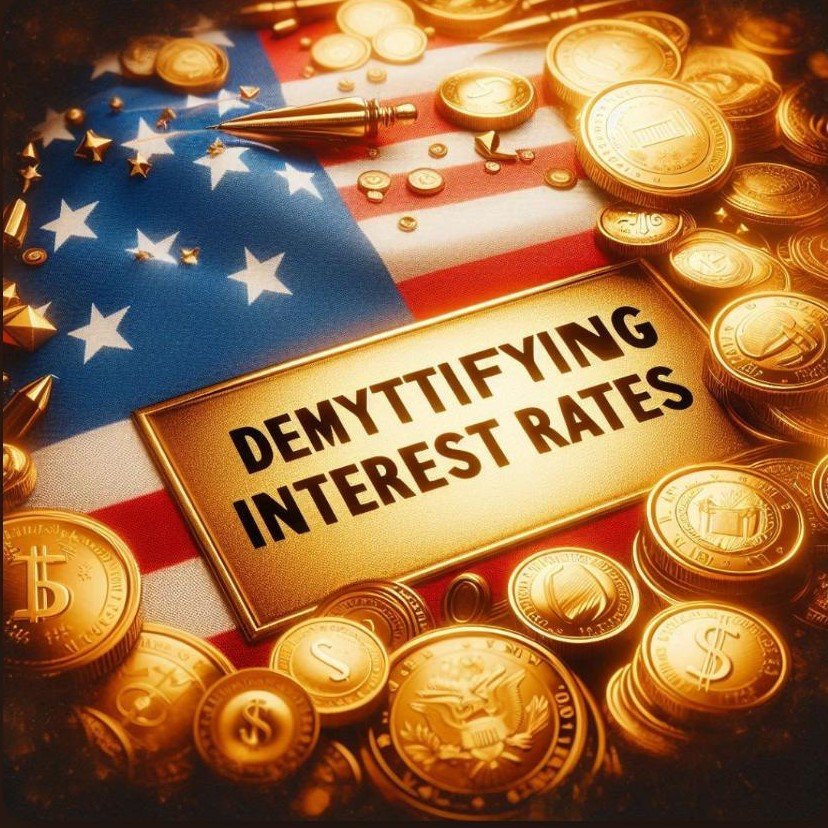Demystifying Interest Rates: How They Impact Your Money and the Economy
What Are Interest Rates?
Interest rates are a basic part of how money works. Imagine you want to borrow money from a bank to buy something, like a car or a house. The bank will let you borrow the money, but they charge you a fee for doing so. This fee is called interest, and the percentage the bank charges you is called the interest rate.
On the other hand, if you save money in a bank, the bank might pay you interest as a reward for letting them hold your money. In this case, the interest rate is how much the bank will give you for keeping your money there.
How Are Interest Rates Decided?
Interest rates don’t come out of nowhere—they are influenced by a base lending rate set by central banks. Every country has a central bank, like the Federal Reserve in the U.S. or the European Central Bank (ECB) in Europe. These central banks set a base rate, which helps regular banks decide how much to charge when lending money or how much to pay when people save money.
Central banks change interest rates to help keep the economy stable, especially when it comes to controlling inflation (when prices of things like food, gas, and clothes go up). Here’s how:
If inflation is too low: The economy might be slowing down because people aren’t spending enough money. To fix this, the central bank might lower interest rates. When rates are low, it’s cheaper to borrow money, so people and businesses tend to spend more, helping the economy grow.
If inflation is too high: If prices are rising too fast, the central bank might raise interest rates. This makes borrowing money more expensive, which slows down spending and helps keep prices from going up too quickly.
How Do Interest Rates Affect the Economy?
Interest rates have a big impact on what people and businesses do with their money. When rates are low, borrowing money is cheaper, so people are more likely to take out loans to buy homes or cars, and businesses might invest in new projects. This helps the economy grow.
However, when interest rates are high, borrowing becomes expensive. Fewer people and businesses take out loans, so spending slows down. This can cool off an overheated economy and prevent inflation from getting out of control.
How Do Interest Rates Impact Currencies?
Interest rates don’t just affect loans and savings—they also influence the value of a country’s currency. When a country has high interest rates, it becomes a more attractive place for foreign investors to put their money because they can earn more on their investments.
For example, if the U.S. has higher interest rates than other countries, international investors may want to invest in U.S. dollars. This increases demand for the dollar, making it stronger compared to other currencies.
If a country lowers its interest rates, its currency might weaken because investors aren’t as interested in earning lower returns. This can make its currency less valuable compared to others.
How Do Interest Rates Affect the Price of Gold?
Gold is different from other investments because it doesn’t earn interest like savings accounts or bonds. When interest rates go up, people often prefer to invest in things that give them interest (like bonds or savings accounts) instead of gold, which doesn’t provide regular earnings.
Also, gold is usually priced in U.S. dollars. So, when U.S. interest rates go up, the value of the dollar often rises, making gold more expensive to buy in other countries. This can cause the price of gold to go down.
What Is the Fed Funds Rate?
In the U.S., one of the most important interest rates is called the Fed Funds Rate. This is the rate that banks charge each other when they lend money overnight. This might sound like something only banks care about, but it’s a big deal because it helps the Federal Reserve control the U.S. economy.
The Fed Funds Rate is usually given as a range, like 4.75% to 5.00%. The higher number is the one usually mentioned in the news. When the Federal Reserve changes this rate, it sends a signal about how the economy is doing—whether they think inflation needs to be controlled or if they want to encourage more borrowing and spending.
Why Do Interest Rates Matter to You?
Interest rates matter to everyone, including you. Here’s how:
For borrowers: If you want to borrow money to buy something big, like a car or a house, higher interest rates mean you’ll have to pay more in interest over time. This makes the loan more expensive.
For savers: If you’re saving money in a bank, higher interest rates mean you’ll earn more. So, if interest rates go up, your savings will grow faster.
For investors: Interest rates affect the stock market, bonds, and other investments. When interest rates rise, bonds and savings accounts become more attractive because they offer better returns. Meanwhile, stocks and gold might become less popular since they don’t offer guaranteed returns.
Conclusion
To sum up, interest rates are the cost of borrowing money or the reward for saving it. They’re influenced by central banks, like the Federal Reserve in the U.S., and play a huge role in managing inflation and the economy. They also affect the value of currencies, the price of gold, and how people invest their money. Understanding how interest rates work can help you make better decisions about borrowing, saving, and investing.
So, next time you hear about interest rates in the news, you’ll understand how they affect not just the economy, but your everyday life too!


